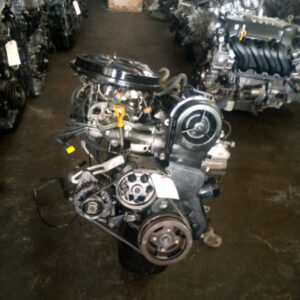Why the Toyota Tazz Remains a Popular Choice for Budget-Conscious Drivers
Why the Toyota Tazz Remains a Popular Choice for Budget-Conscious Drivers
Blog Article
Check Out the Most Current Fads in Engine Technology Through Tazz
In the swiftly evolving landscape of automotive modern technology, Tazz stands at the leading edge, highlighting significant advancements in engine systems that prioritize both development and sustainability. tazz. From crossbreed engines that maximize fuel efficiency to the emergence of hydrogen gas cells, the trends forming contemporary powertrains are not just improving efficiency but also attending to important ecological challenges. As the sector remains to push boundaries, it is necessary to consider exactly how these developments will certainly affect future transportation solutions and the wider ramifications for global power intake. What exists ahead in this critical change?
Crossbreed Engine Innovations
Crossbreed engine advancements stand for a pivotal shift in auto innovation, incorporating the advantages of internal burning engines with electric propulsion systems. This integration not only enhances gas efficiency but also minimizes emissions, conference significantly rigid environmental policies. By using both power resources, hybrid engines can maximize efficiency, supplying power when required while preserving gas throughout much less requiring driving conditions.
Recent advancements in hybrid modern technology include improvements in battery performance and regenerative braking systems. These technologies enable greater energy recovery during deceleration, which can be rerouted to assist in acceleration or power accessory systems. Makers are focusing on small styles and lightweight materials to make best use of the efficiency of hybrid powertrains.
The advancement of plug-in crossbreeds has also increased the marketplace, allowing vehicle drivers to charge their vehicles making use of standard electric outlets. This feature commonly permits for considerable all-electric array, further decreasing dependence on conventional fuels. tazz. As the auto industry proceeds to evolve, hybrid engine innovations are expected to play a crucial role in connecting the space between traditional cars and fully electric designs, offering a transitional solution that caters to varied customer requirements and choices
Breakthroughs in Electric Powertrains
The automotive landscape is swiftly developing, with electrical powertrains arising as a leading force in lasting transport. Advancements in electrical lorry (EV) technology are considerably boosting user, efficiency, and efficiency experience. Secret developments consist of improvements in battery chemistry, which have actually boosted power density, decreased charging times, and prolonged general battery life.
Solid-state batteries, for instance, assure to transform the market by providing greater security and performance compared to typical lithium-ion cells. Moreover, improvements in regenerative braking systems are allowing automobiles to recoup power throughout slowdown, adding to overall efficiency.
Along with battery technology, electrical motor layouts are coming to be much more advanced. Innovations such as incorporated electric motors and progressed thermal monitoring systems are assisting to optimize power distribution and reduce weight, inevitably enhancing automobile dynamics.

Collectively, these developments highlight the dedication to change in the direction of cleaner, extra efficient transport solutions, positioning electrical powertrains at the forefront of vehicle innovation.
The Rise of Hydrogen Gas Cells
Progressively, hydrogen fuel cells are obtaining traction as a feasible choice to traditional internal combustion engines and battery electric automobiles. This modern technology utilizes the chemical energy stored in hydrogen, converting it into electricity with an electrochemical reaction with oxygen. The key result of this process is water, making hydrogen gas cells an eco friendly choice with zero exhausts at the tailpipe.

Automakers are increasingly buying hydrogen gas cell innovation, identifying its capacity for long-range applications and quick refueling capabilities that equal standard gas. Additionally, sectors such as durable transportation and public transit are specifically appropriate for hydrogen fuel cells, where battery electrical solutions might fail as a result of weight and range restrictions.
As research and investment remain to expand, hydrogen gas cells are positioned to play a considerable role in the future landscape of clean transportation and power options.
Enhancements in Internal Combustion Engines
Advancements in interior combustion engine (ICE) innovation are transforming traditional lorries to meet modern ecological requirements and performance expectations. Among the most substantial enhancements involves the assimilation of advanced fuel injection systems. These systems optimize the air-fuel blend, improving combustion performance and resulting in reduced emissions. Straight fuel shot, as an example, permits much better atomization of fuel, causing even more complete burning and improved power output.
Additionally, turbocharging has actually gotten prestige, permitting smaller sized engines to supply higher efficiency without the weight of bigger engines - tazz. This technology not just increases performance however likewise adds to reduce fuel consumption. Variable shutoff timing systems are likewise being fine-tuned, allowing engines to adapt to various driving problems for boosted torque and responsiveness
In addition, making use of lightweight materials in engine building is ending up being conventional, further enhancing fuel performance by decreasing overall vehicle weight. Engine control units (ECUs) are significantly advanced, making it possible for real-time changes that enhance efficiency and emissions.
These improvements jointly signify a critical shift in ICE technology, straightening with international sustainability objectives while still providing the efficiency vehicle drivers anticipate from their vehicles. As the industry evolves, these improvements proceed to form the future of conventional automobile engineering.
Future Fads in Engine Performance
Considerable innovations in engine efficiency are expected as makers concentrate on incorporating advanced modern technologies to fulfill strict environmental guidelines and consumer needs. The change towards electrification, crossbreed systems, and alternate fuels is reshaping the automobile landscape, driving advancements that enhance gas economic situation and decrease emissions.
Among the vital trends is the implementation of innovative products and making methods. Lightweight compounds and high-strength alloys add to lowered lorry weight, more thus improving general efficiency. In addition, the fostering of turbocharging and variable valve timing modern technologies enables right here improved power outcome from smaller engines, even more boosting gas economic climate.

Verdict
Finally, the exploration of engine modern technology discloses significant developments that focus on sustainability and effectiveness. Technologies in hybrid engine systems, electrical powertrains, and hydrogen fuel cells show a commitment to minimizing exhausts while enhancing performance. Enhancements in interior burning engines and a focus on lightweight materials contribute to overall engine effectiveness. As the automotive industry proceeds to evolve, these patterns will certainly play a vital function fit a cleaner and more sustainable future for transportation.
From hybrid engines that enhance gas performance to the emergence of hydrogen fuel cells, the fads forming contemporary powertrains are not only boosting performance but likewise dealing with essential environmental difficulties.Crossbreed engine developments represent a pivotal shift in automotive technology, incorporating the advantages of interior burning engines with electric propulsion systems.Additionally, turbocharging has gotten prestige, enabling smaller engines to deliver greater performance without the weight of bigger engines. Additionally, the adoption of turbocharging and variable valve timing innovations permits for improved power result from smaller sized engines, further boosting gas economic climate.
Improvements in interior combustion engines and an emphasis on light-weight products contribute to overall engine efficiency.
Report this page